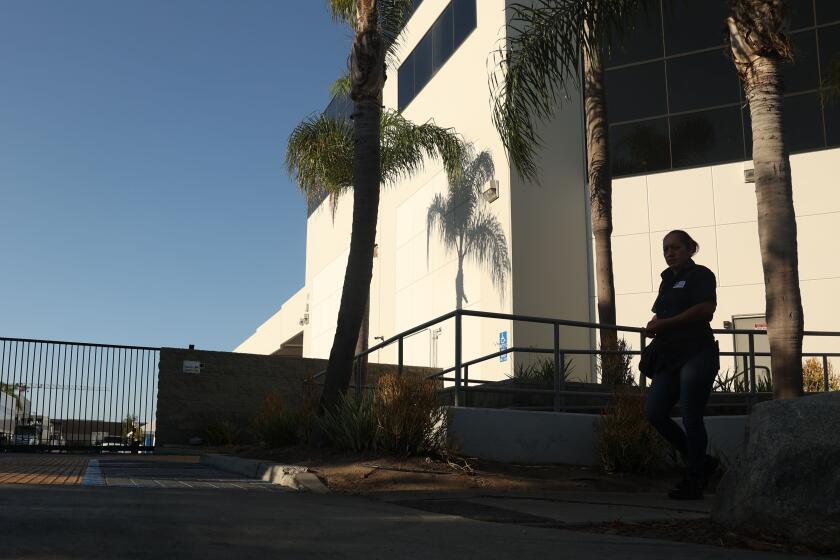Lawmakers take ‘creative’ approach to enforcing heat safety rules for California farmworkers

- Share via
Erika Patricia Deluque Barros said she was working in a tomato field in Yolo County when she first started feeling shaky and nauseous. An immigrant from Colombia with little experience working in the fields, she said she didn’t know at the time that the summer heat could make her sick.
“I didn’t know the sun here could kill,” Deluque Barros said. “I didn’t know what sunstroke was, and nobody had told me what could happen.”
Two weeks later, she said, she was working in searing heat and once again started feeling dizzy and nauseous. She said she took a break under a tree, but felt faint as soon as she returned to work. It felt too hot to work safely, she said, so she and five others got permission from their supervisor to leave early.
But when the laborers returned to the field early the next morning, according to a complaint filed with the state Labor Commissioner’s Office, they were handed their final checks and fired.
“I was surprised; I was humiliated; I felt bad,” Deluque Barros recalled. “On one hand, I keep thinking, ‘I should have tolerated it, because I needed the work.’ But on the other hand, I’ve also been thinking that people should have dignity and shouldn’t have to put up with so much just for a job.”
The state Agricultural Labor Relations Board is investigating the incident as a retaliatory firing. And the workers — now dubbed the Yolo Six — have been held up as an example of the need for California to do more to enforce compliance with heat safety rules for farmworkers that have been in place for nearly two decades.
A bill on Gov. Gavin Newsom’s desk aims to compel employer compliance with the state’s outdoor heat safety standards by making it easier for farmworkers to make a workers’ compensation claim for heat illness.
SB 1299 would change the burden of proof in workers’ compensation claims when a farmworker develops a heat-related injury after laboring outdoors for an employer who fails to comply with the heat standards. Instead of the farmworker having to prove the injury occurred on the job, as is typical in workers’ compensation cases, it would be the employer’s responsibility to prove the illness was not work-related.
Opponents of the bill, including the California Chamber of Commerce and the California Farm Bureau, acknowledge the importance of protecting farmworkers from heat illness, but argue the issue should not be addressed through the workers’ compensation system.
The legislation comes as many farmworkers continue to labor in unsafe conditions and the California Division of Occupational Safety and Health confronts a severe staffing shortage that is hampering its ability to enforce heat regulations for outdoor workers.
First enacted in 2005, the state’s heat illness prevention rules require employers to provide outdoor workers with fresh water, access to shade at 80 degrees and warmer, and cool-down breaks whenever a worker requests one. Employers must also maintain a heat illness prevention plan with effective training for supervisors to recognize the signs and symptoms of heat illness.
Enforcement of the rules has proved challenging.
In 2009 and 2012, the United Farm Workers sued Cal/OSHA, accusing the agency of failing to enforce the regulations.
A 2022 study by the UC Merced Community and Labor Center found many farmworkers were still laboring without the protections.
Of the more than 1,200 farmworkers surveyed, 43% reported their employers had not provided a heat illness prevention plan and 15% said they had not received heat illness prevention training. Additionally, 20% reported their employers did not monitor the temperature on hot days, 15% said their employers failed to provide enough shade for breaks when temperatures reached 80 degrees and higher, and 22% said their employers did not monitor for heat illness when the temperature reached 95 degrees.
“This has just been a really persistent challenge of, how do you make sure that the laws on the books are the laws in the fields?” said Antonio De Loera-Brust, communications director for the UFW, which sponsored SB 1299.
The bill’s author, Sen. Dave Cortese (D-San José), described SB 1299 as a “creative workaround” that is “taking the tools that we do have available and trying to cobble together an approach that will hopefully spur greater compliance.”
Under the bill’s provisions, if an employer fails to comply with the rules, any resulting heat-related injury to an employee “shall be presumed to arise out of and in the course of employment.” It would create a “rebuttable presumption,” which is more commonly used for law enforcement officers and firefighters who develop certain injuries that could arise from the risks inherent to their jobs.
“The employers hate the workers’ comp presumptions so much that it makes me feel like it might actually work,” Cortese said. “The avoidance factor is so high with them that they’ll say, ‘My God, it’s actually easier for us to provide shade and water than to have to deal with a proliferation of expedited workers’ comp claims.’”
“We’re trying to take something that they view as kind of a thorn in their side and use it as a disincentive for the kind of behavior we’re seeing,” he said.
Compliance with California’s indoor heat standards varies by industry and workplace. Some workers continue to swelter. Many weren’t aware of the new rules.
Ashley Hoffman, senior policy advocate for the California Chamber of Commerce, took issue with the approach during an Assembly committee hearing in June, contending there is no evidence that the workers’ compensation system is failing in regard to heat claims filed by agricultural workers.
She pointed to a legislative analysis by the California Workers’ Compensation Institute that found very few agricultural heat illness claims had been filed in California. The analysis also found heat illness claims filed by agricultural workers have a denial rate of 11%, lower than the 12.4% to 13.3% denial rates for other outdoor occupations covered by the heat standard and the 14.7% denial rate for all claims.
“Utilizing a very unique workers’ compensation system with its own unique procedures to address this separate problem, when the data shows us that the system itself is functioning well and how it’s supposed to with regard to these claims, we do not believe is the right solution,” Hoffman said during the hearing.
Bryan Little, director of employment policy for the California Farm Bureau, called the legislation a “solution in search of a problem.” He noted Cal/OSHA is already hiring for a new agricultural unit that would significantly expand enforcement offices, including in the communities of Lodi, Salinas, El Centro and Fresno.
“I don’t know what else to say,” Little said. “It’s problematic in terms of just continuing to add rebuttable presumptions to workers’ comp law when you don’t really need it and Cal/OSHA is already moving to address the problem.”
Newsom has until Sept. 30 to sign or veto the bill.
This article is part of The Times’ equity reporting initiative, funded by the James Irvine Foundation, exploring the challenges facing low-income workers and the efforts being made to address California’s economic divide.
More to Read
Sign up for Essential California
The most important California stories and recommendations in your inbox every morning.
You may occasionally receive promotional content from the Los Angeles Times.












